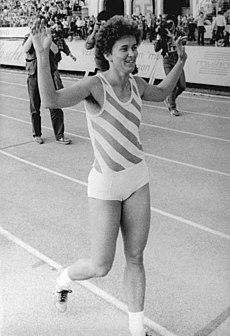Marlies Gohr
 |
||
| Medal record | ||
|---|---|---|
| Women's athletics | ||
| Representing |
||
| Olympic Games | ||
| 1976 Montréal | 4 x 100 m relay | |
| 1980 Moscow | 4 x 100 m relay | |
| 1980 Moscow | 100 m | |
| 1988 Seoul | 4 x 100 m relay | |
| World Championships | ||
| 1983 Helsinki | 100 m | |
| 1983 Helsinki | 4x100 m relay | |
| 1987 Rome | 4x100 m relay | |
Marlies Göhr (née Oelsner, born 21 March 1958 in Gera, Thuringia) is a former East German track and field athlete, the winner of the 100 metres at the inaugural World Championships in 1983. She ranked in the top 10 of the 100 m world rankings for twelve straight years, ranking first in six of those years. During this time she won many medals as a sprinter at major international championships and set several world records.
Competing under her maiden name of Oelsner, Marlies finished second in the 100 m in her first major international at the 1975 European Athletics Junior Championships in Athens. The following year, at the 1976 Olympic Games in Montreal, she qualified for the 100 m final, finishing eighth, but went on to win her first Olympic gold medal on East Germany's victorious 4 x 100 m relay team.
Her breakthrough year was in 1977, winning the 100 m title at the East German championships at Dresden in a world record time of 10.88 s. This landmark performance was the first time a woman had run under 11 seconds with electronic timing. Later that year, she won the 100 m title at the inaugural World Cup in Düsseldorf, where she also won a silver medal in the relay.
She had a unique style of running, dubbed 'sewing machine' (or 'staccato') for the high frequency of relatively short-paced strides (this is very easy to see in the 1977 World Cup Video after 2′53″ on YouTube).
...
Wikipedia
